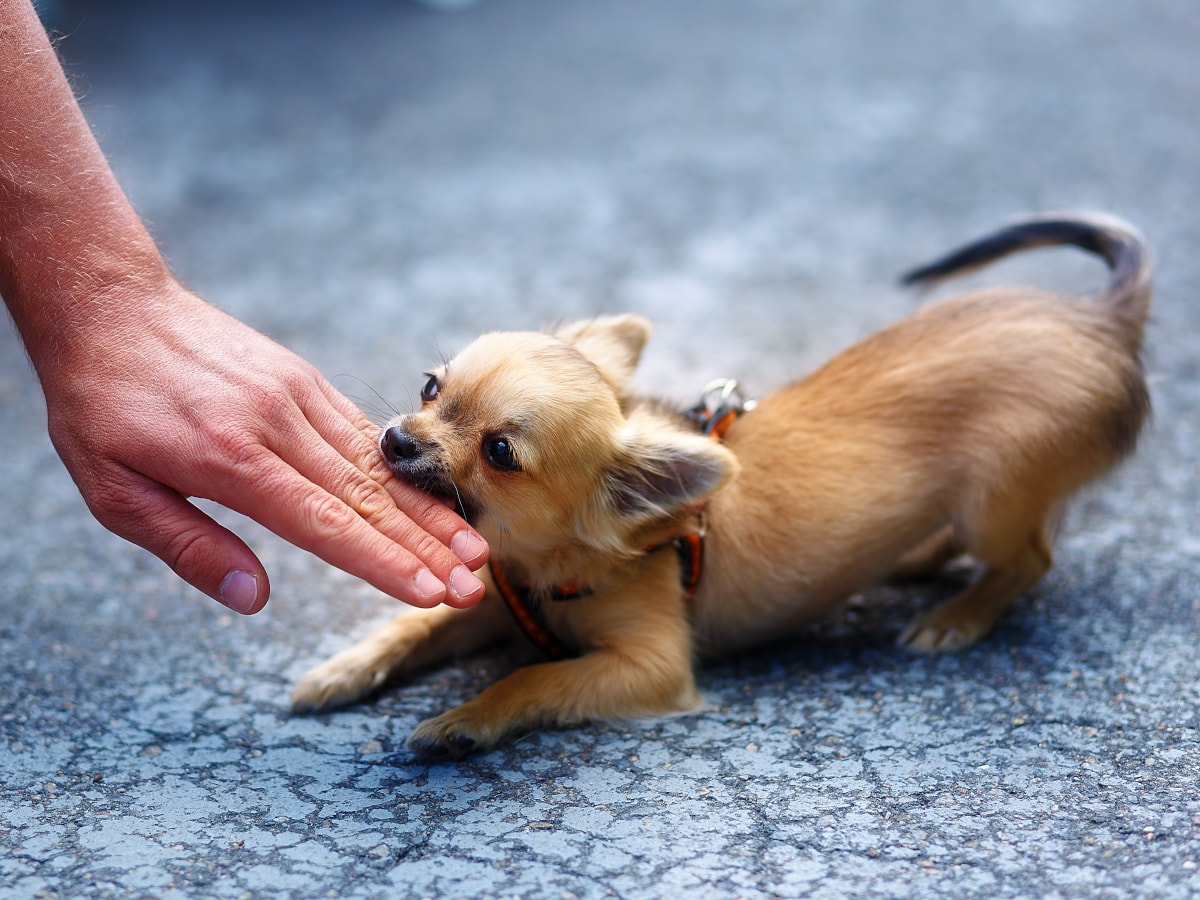When an adorable fluffy little ball of fur decides to sink their razor sharp teeth into your skin, clothes, or furniture it can be a nightmare trying to create a pain-free damage control plan for all involved. Puppies love to bite. In fact, they need to. Without hands, pups use their little jaws to experience the world around them. Training your mouthy puppy to stop biting will require a lot of patience and dedication, but it will be well worth it.
Why You Should Teach Your Puppy Bite Inhibition
A puppy that doesn’t understand and master bite inhibition will grow into a dog with stronger jaws and less self-control. This increases the danger of your pet becoming a dog that could injure someone whether by accident or on purpose. A pup that learns human skin is fragile has a higher chance of growing into a dog that won’t ever bite hard enough to hospitalize someone even if severely provoked. That kind of skill is vital for a puppy to understand and master since it will eventually encounter potential high-stress situations like strangers, children, or other dogs.
How to Teach Your Puppy Bite Inhibition
Bite inhibition takes time to teach. Some puppies master this quickly, while others take several months before they learn humans aren’t chew toys. Teething also provokes gnawing tendencies since their gums will be aching and need relief. The key is to teach your pup that biting hard isn’t fun and will stop playtime.
- Get Your Pup’s Attention – When your puppy begins biting down, say something in a loud enough voice that gets your pup’s attention, but doesn’t frighten it. This could be a yelp, “ouch,” “oops,” etc.
- Mimic Puppy Behavior – Upon saying the word let your hand go limp and stop playing for several seconds. Don’t flinch or pull away. This can entice your pup to play harder. The idea is to get the message across that hard biting is not okay and stops the fun. There is a catch to this.
- Mini Timeout – All dogs are different. Sometimes, yelping or saying something will provoke a pup into biting harder. If this is the case, create some distance between you and your puppy. You may have to go into the next room or leave the play area. Wait for about 30 seconds to a minute for your puppy to calm down and then resume play. This sends a strong message that hard bites stop the fun and soon your pup will learn how to better control their behavior.
- Build to Softer Bites – Once your puppy understands chomping down isn’t okay, move to the next hardest bite. Continue with this until your puppy’s teeth barely graze your skin.
- Teach The Leave It Command – As your puppy continues to learn bite inhibition, you can start teaching them the “Leave It” command. This is an extremely useful skill for all sorts of situations including biting. You can learn more about this trick at rover.com.
More Ways To Help A Mouthy Puppy
Something else you can do when teaching your puppy bite inhibition, is redirection. When your puppy bites too hard, you can entice them with a toy instead. This also works well when greeting visitors. Anytime someone comes to visit, you can create a habit of offering your pup a toy they can grip while greeting your guest. This relieves the excitement and gives your dog’s mouth something to do. Keep some toys by the door so your dog comes to understand that when guests come they get a fun reward.
Another option while greeting visitors is to have your puppy sit before every introduction. This does several things. It teaches self-control, prevents jumping up, and gets your puppy in training mood. They’ll more interested in the treat they might get for being good rather than gnawing on visitors.
You might also want to try teaching your puppy targeting. If your pet gets super hyper around people and refuses to listen, try teaching them to boop a friend with their nose instead of teeth. This way they can satisfy their need to greet while keeping their sharp teeth hidden. The AKC has great suggestions on how to get started teaching your puppy to target.
Also, buy a variety of toys for your dog. When your puppy gets bored, they will find outlets, destructive outlets. Kong toys and Nylabones are great options. Also, make sure to avoid giving your pup old clothes to munch on. It’s incredibly disheartening watching an adult dog rip your new pair of sneakers to shreds.
Avoid Physically Punishing Your Puppy
Slapping, muzzle holding, finger prodding, nose flicking, etc. do nothing to teach your puppy what is correct behavior. This only creates confusion and pain as your puppy is forced to stop playing for an unknown cause. If anything, these methods will only teach your pup to fear you which is the last thing you want.
In Conclusion
It takes time for a puppy’s adult teeth to grow in. In the meantime, they’re going to want to chew, chew, chew. It’s important that you stay patient with your young pup. They’re still developing and learning. When you put in the time and effort to train your mouthy puppy bite inhibition, you’ll lower the risk of any serious bites, teach your dog self-control, and build a better relationship with your furry pal.
We’d love to hear your stories! Do you have a furry little biter? What’s helping you get through it?
